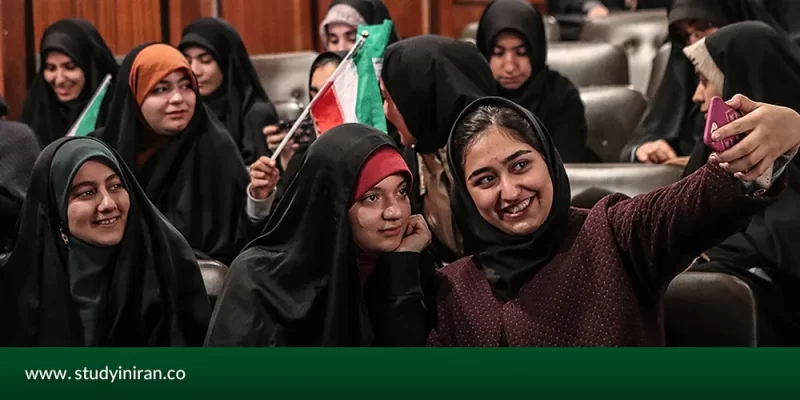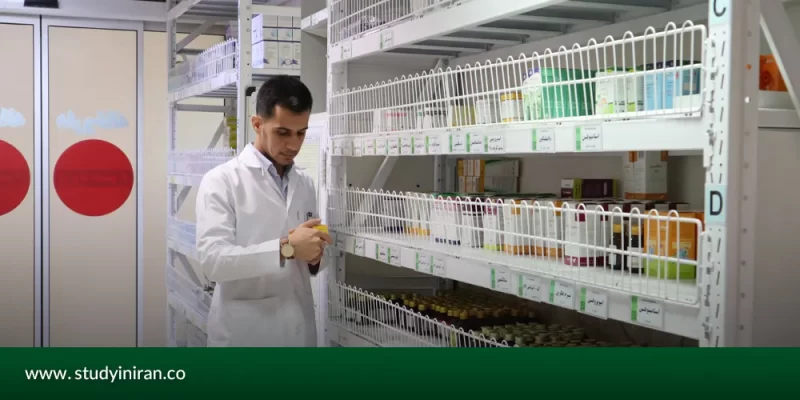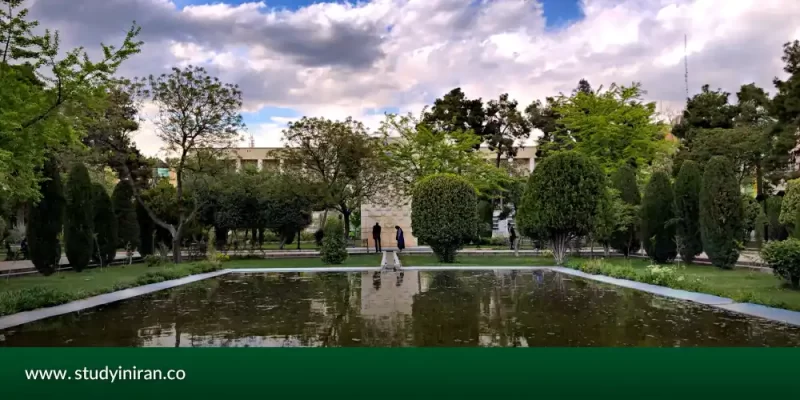- The Best Time to Apply for an Iranian Student Visa
- How to Apply for University Admission in Iran
- Student Visa Requirements for Iran
- Student Visa Cost and Validity for Iran
- Iran Student Visa: Cost and Validity
- If your Iran student visa is rejected, common reasons include:
- Switching from a Tourist Visa to a Student Visa in Iran
- Working While Studying in Iran
- Student Dependent Visa in Iran
- Notes for Students from India, Pakistan, Iraq, and Afghanistan
- Final Note
- Frequently Asked Questions (FAQ)
If you’re considering studying abroad and looking for a destination that offers a unique blend of culture, history, and high-quality education, Iran is a compelling choice. The country’s universities rank among the top in the region and have increasingly focused on welcoming international students. With a strong academic framework, advanced research facilities, and highly qualified faculty, Iran provides a serious and stimulating environment for higher education.
To study in Iran, international students must obtain a Iran student visa. The application process is straightforward and trackable, provided that all required documents are properly prepared. For detailed guidance and support, institutions like Study in Iran—the official platform of Iran’s Ministry of Science—can assist you through each step, from selecting a university to securing your visa and settling in. Studying in Iran can open the door to a truly enriching academic and cultural experience.
The Best Time to Apply for an Iranian Student Visa

The ideal time to apply for a student visa for Iran is at least 3 to 4 months before the start of the academic semester. This timeline allows you to complete all the necessary steps without pressure and with proper preparation:
1. Secure admission
First, you need to obtain an admission letter from one of Iran’s recognized universities. This process may take anywhere from a few weeks to a few months, especially if your application requires document verification or an interview.
2. Preparing Required Documents
Once you have your admission, you’ll need to gather the necessary documents for the visa application. These typically include your letter of admission, a valid passport, proof of financial means, passport-sized photos, completed application forms, and a medical certificate. If this step is delayed, it can cause serious setbacks later in the process.
3. Apply through the Iranian embassy or consulate
You’ll need to schedule an appointment at the Iranian consulate or embassy in your country to submit your visa application. The review and processing period can take anywhere from 2 to 6 weeks.
4. Sort out travel and housing
Once your visa is approved, make sure you have enough time to plan your trip, book student housing or other accommodations, purchase your plane ticket, and handle final logistics before traveling.
By following this schedule, you can ensure a smoother, stress-free process and be fully prepared for your academic journey in Iran.
How to Apply for University Admission in Iran
If you’re interested in studying at an Iranian university as an international student, there’s a clear and structured application process. Here’s a step-by-step guide to applying for university admission and obtaining a student visa:
1. Choose Your University and Contact the Department
Start by selecting a university and a program that matches your interests. Visit the official university website and reach out to the relevant academic department via email. You’ll receive information about admission requirements, deadlines, and necessary documents. Typically, you’ll be asked to submit:
- Your CV (résumé)
- Academic transcripts
- Previous diplomas (high school, undergraduate, etc., depending on the level of study)
- Proof of language proficiency (if required)
2. Prepare for an Interview or Entrance Exam
Many Iranian universities conduct an online interview with faculty members or the department head to evaluate international applicants. In some cases, you may also be asked to complete an online entrance exam related to your chosen field of study.
3. Obtain the Eligibility Certificate
If the department approves your qualifications, you’ll receive an Eligibility Certificate, which confirms your preliminary acceptance and eligibility to study in Iran as an international student.
4. Begin the Student Visa Process
Step 1: Visit a Licensed Travel Agency
With your eligibility certificate in hand, contact a travel agency authorized by the Iranian government. These agencies help you complete and submit your student visa application.
Step 2: Submit Documents to Iran’s Ministry of Foreign Affairs
The agency will forward your application and supporting documents to the Iranian Ministry of Foreign Affairs. Unlike other visa types, student visas must be processed through an official agency or embassy—there is no direct online application option.
Step 3: Receive Your Visa Authorization Code
After your application is reviewed, the Ministry of Foreign Affairs or a consulate will issue a visa authorization number, which the agency will share with you.
Step 4: Finalize Your Visa at the Embassy
With your authorization code, go to the nearest Iranian embassy or consulate to receive your physical student visa. Bring your passport, visa form, photos, proof of health insurance, and any other required documents.

Student Visa Requirements for Iran
If you’re planning to study in Iran, you’ll need to prepare the following documents to apply for a student visa:
- Passport Photos: Two recent passport-sized photos. For women, a headscarf is required in accordance with local dress code regulations.
- Passport Copies: Two copies of a valid passport with at least 6 months of remaining validity.
- Visa Application Form: Accurately complete the official visa application form provided by the Iranian embassy or consulate.
- Eligibility Certificate: A confirmation letter from your chosen Iranian university stating that you’ve been accepted and meet the academic requirements.
- Visa Authorization Code: A code issued by Iran’s Ministry of Foreign Affairs or an Iranian consulate, required to move forward with the visa process.
- Financial Proof: Documentation showing that you have sufficient funds to cover your tuition and living expenses in Iran. This may include bank statements, scholarship confirmation, or a financial support letter.
- Visa Fee: Payment of the visa fee, which varies depending on your nationality.
Once you’ve gathered these documents, you can proceed with your student visa application confidently and get ready for your academic journey in Iran.
Student Visa Cost and Validity for Iran
- The cost varies depending on the applicant’s country and the type of study program. For example, British applicants pay around 180 euros for the visa. To reduce living expenses in Iran, students are encouraged to apply for scholarships available to international students.
- The student visa is generally valid for one year and can be renewed annually through the immigration police. It’s recommended to apply for renewal at least 30 days before the visa expires.
Iran Student Visa: Cost and Validity
- Visa fees vary by country and program. For instance, UK applicants pay about 180 euros. Students can apply for scholarships to help with living costs in Iran.
- The visa is usually valid for one year and can be renewed annually through immigration authorities. Renew at least 30 days before expiry.
If your Iran student visa is rejected, common reasons include:
- Incomplete documents
- Academic eligibility issues
- Financial documentation problems
- Previous visa violations
Recommended action: Contact the university or agency, fix the issues, and reapply through the same channel.

Switching from a Tourist Visa to a Student Visa in Iran
You can’t convert a tourist visa to a student visa while inside Iran. This change needs to be approved officially before you arrive. For any visa status changes, check in first with BAFIA (Foreign Nationals’ Affairs Office) and your university.
Working While Studying in Iran
Working while studying for international students in Iran isn’t officially widespread like in some countries. However, some major public universities offer limited on-campus jobs such as research assistant, teaching assistant, or roles in libraries, labs, or administrative offices. These positions usually pay modestly but can help cover part of living expenses and add valuable experience to a student’s resume.
Since international students often don’t have direct access to external funding, working during studies can be an important supplement. Still, students should check with their university about work regulations and student work permits before starting any job. Working off-campus, especially in informal or freelance roles, may have legal restrictions and usually requires coordination with Iran’s Foreign Nationals’ Affairs Office (BAFIA).
Student Dependent Visa in Iran
If you have a student visa in Iran, you can apply for dependent visas for your spouse and children.
Required documents:
- Marriage certificate
- Passports of dependents
- Your student enrollment and residence documents
- Proof of financial support
Note: You usually apply for this visa after you start studying in Iran. The dependent visa can’t be issued at the same time as your student visa, so your family can join you only after you arrive.
Notes for Students from India, Pakistan, Iraq, and Afghanistan
- Students from India, Pakistan, and Iraq can apply for a student visa through Iranian embassies in New Delhi, Islamabad, and Baghdad.
- Afghan students may face special procedures managed by the Iranian embassies in Kabul and Herat. Coordination with the relevant embassy before applying is essential.
Tip: Following the visa process through official Iranian representatives in these countries helps students experience a smoother and faster application.
Final Note
Study in Iran offers not only a chance for academic growth in one of the most culturally rich and historic countries but also a unique experience of living, learning, and engaging with a passionate and welcoming community. With universities prioritizing quality education, research, and innovation, Iran can be a solid launchpad for a bright future.
If you want to start this journey with confidence, Study in Iran, the official representative of the Ministry of Science, Research, and Technology, is a reliable partner. They provide step-by-step guidance, simplify the admission and visa processes, and offer professional support, making studying in Iran accessible and straightforward for international students.
Trust Study in Iran and begin your academic journey with peace of mind.
Frequently Asked Questions (FAQ)
First, secure admission from a recognized Iranian university. Then, apply through a trusted travel agency that will send your documents to Iran’s Ministry of Foreign Affairs.
University acceptance letter
Passport valid for at least 6 months
Financial proof (ability to cover expenses)
Medical certificate
Completed visa application form
Visa fee payment
Usually between 2 to 8 weeks, depending on nationality and workload at the Ministry of Foreign Affairs.
Yes, with university approval, you can work in campus jobs such as teaching or research assistant roles.
It varies by nationality; for example, British applicants pay around 185 euros. Other nationalities might pay less.
Yes, especially for fields like theology, archaeology, engineering, and Persian studies, offering a rich cultural, academic, and affordable environment.
Yes, student visas are usually valid for one year and can be renewed annually through Iran’s immigration police.
After admission, apply via a reliable immigration agency like Study in Iran and submit your documents to the Iranian embassy or consulate in your country.






0 Reply To “Iran student visa”